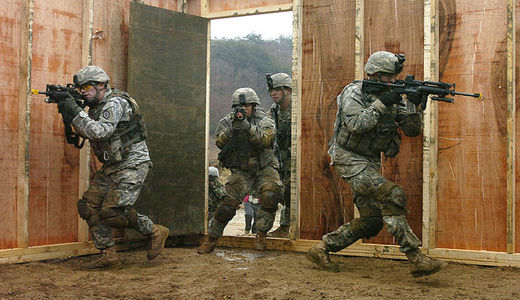
In recent weeks, a war of rhetoric and provocative actions has flared up between North Korea on the one hand, and South Korea and the United States on the other. We have heard much about the hostile language of North Korean leader Kim Jong-un. But the American people should also understand that provocative actions by the U.S. and South Korean governments have contributed mightily to the tensions. These include U.S. and South Korean joint military maneuvers, including trial bombing runs by U.S. B-2 Stealth bombers.
There is no sign of troop movements in the North that could indicate Kim’s words are about to be backed up with military action, but there is nevertheless a real danger that the tensions might lead to an armed incident, with tragic consequences.
The corporate media has concentrated on bellicose statements by Kim Jong-un, who has talked about massive retaliation against South Korean and U.S. targets if his country is attacked. Although these over-the-top statements and nuclear posturing have contributed to tensions and cannot be condoned, irresponsible rhetoric and actions are not a monopoly of the North.
South Korean President Park Guen-hye also said, “I believe that we should make a strong and immediate retaliation without any other political considerations if [the North] stages any provocation against our people.” A “provocation” could be any small-scale incident.
Some context is helpful to understand these developments.
The Korean War of 1950-1953 ended with an armistice only; technically, the war has never ended. Since that time, the North has been a poor and isolated state (population 24 million), which considers itself threatened on a daily basis by South Korea (population 50 million) and by the 28,000 U.S. troops and much military hardware stationed south of its border.
Unfortunately, North Korea seems to be using nuclear weapons as a way of redressing the balance of power. This brinkmanship has led to economic sanctions imposed by the United Nations, especially after North Korea’s atomic test in February and recent rocketry tests. Using nuclear weapons like this is a dangerous and slippery road. The international peace movement has, correctly in our view, urged a nuclear-free Korean peninsula for many years.
The U.S. has a great deal of responsibility to bear for creating this current mess. Not only the provocative ongoing military exercises and our own use of nuclear weapons, but the recent interventions in Libya and elsewhere contribute to the tensions on the peninsula.
It is in the interest of the American people and the worldwide peace majority that all parties – on all sides – publicly commit to a peaceful resolution. China, Venezuela, Ecuador and other countries, as well as Pope Francis in his first Easter message, called for a reduction of tensions and a peaceful resolution of the Korea confrontation.
The U.S. should not use military maneuvers in Korea to try out new weapons and make political points, but instead should coordinate with China and other countries to calm down this dangerously overwrought situation.
Photo: U.S. Army soldiers conduct room clearing procedures as part of joint command and field training exercises in South Korea in 2007. U.S. Navy photo by Mass Communication Specialist 1st Class Daniel N. Woods.












Comments